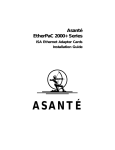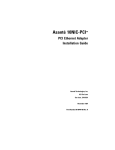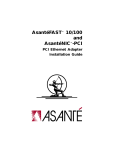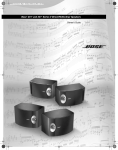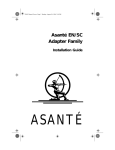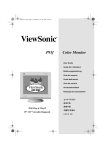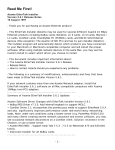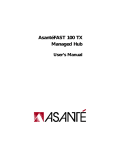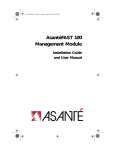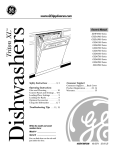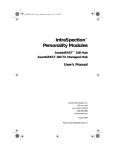Download Asante Asant'eFAST 10 Installation guide
Transcript
AsantéFAST™ 10/100 Fast Ethernet Adapter for NuBus Installation Guide NBAsanteFast IFCover Page 1 Wednesday, August 21, 1996 10:32 AM AsantéFAST™ 10/100 Fast Ethernet Adapter for NuBus Installation Guide Asanté Technologies, Inc. 821 Fox Lane San Jose, CA 95131 September 1995 Part Number 06-00232-00 Rev. A Printed in USA NBAsanteFast IFCover Page 2 Wednesday, August 21, 1996 10:32 AM Copyright Notice Copyright 1995 by Asanté Technologies, Inc. All rights reserved. No part of this manual, or any associated artwork, software, product design or design concept, may be copied, reproduced or stored, in whole or in part, in any form or by any means mechanical, electronic, optical, photocopying, recording or otherwise, including translation to another language or format, without the express written consent of Asanté Technologies, Inc. Trademarks Asanté Technologies and AsantéFAST are trademarks of Asanté Technologies, Inc. Apple, AppleTalk, EtherTalk, AppleShare and Power Macintosh are registered trademarks of Apple Computer, Inc. Ethernet is a registered trademark of the Xerox Corporation. All brand names and products are trademarks or registered trademarks of their respective holders. FCC Information This device complies with part 15 of the FCC Rules. Operation is subject to the following two conditions: (1) this device may not cause harmful interference and (2) this device must accept any interference received, including interference that may cause undesired operation. Operation of this equipment in a residential area is likely to cause interference, in which case, the user, at his own risk and expense will be required to correct the interference. Asanté Warranty Asanté Technologies, Inc. warrants that this product will be free from defects in title, materials and manufacturing workmanship. If the AsantéFAST 10/100 adapter is found to be defective, then, as your sole remedy and as the manufacturer’s only obligation, Asanté Technologies, Inc. will repair or replace the product.This warranty is exclusive and is limited to the AsantéFAST 10/100 adapter. This warranty shall not apply to AsantéFAST 10/100 adapters that have been subjected to abuse, misuse, abnormal electrical or environmental conditions, or any condition other than what can be considered normal use. Warranty Disclaimers Asanté Technologies, Inc. makes no other warranties, express, implied or otherwise, regarding AsantéFAST 10/100 adapters, and specifically disclaims any warranty for merchantability or fitness for a particular purpose. The exclusion of implied warranties is not permitted in some States and the exclusions specified herein may not apply to you.This warranty provides you with specific legal rights.There may be other rights that you have which vary from State to State. Developer tested only, Novell makes no warranty with respect to this product. Limitation of Liability The liability of Asanté Technologies, Inc. arising from this warranty and sale shall be limited to a refund of the purchase price. In no event shall Asanté Technologies, Inc. be liable for costs of procurement of substitute products or services, or for any lost profits, or for any consequential, incidental, direct or indirect damages, however caused and on any theory of liability, arising from this warranty and sale.These limitations shall apply notwithstanding any failure of essential purpose of any limited remedy. DRAFT Table of Contents Introduction . . . . . . . . . . . . . . . . . . . . . . . . . . . . . . . . . . . . . . 1-1 Product Description . . . . . . . . . . . . . . . . . . . . . . . . . . . . . . . . . . . . . . 1-1 Features. . . . . . . . . . . . . . . . . . . . . . . . . . . . . . . . . . . . . . . . . . . . . . . . 1-1 Package Contents . . . . . . . . . . . . . . . . . . . . . . . . . . . . . . . . . . . . . . . . 1-2 Installing the AsantéFAST 10/100 Adapter for NuBus . . . . . 2-1 Installing the Adapter . . . . . . . . . . . . . . . . . . . . . . . . . . . . . . . . . . . . . 2-1 Configuring the Adapter . . . . . . . . . . . . . . . . . . . . . . . . . . . . . . . . . . . 2-2 Configuring 10Mbps or 100Mbps Operation . . . . . . . . . . . . . . . .2-2 Testing the Adapter . . . . . . . . . . . . . . . . . . . . . . . . . . . . . . . . . . . . . . .2-2 Installing the Network Driver . . . . . . . . . . . . . . . . . . . . . . . . 3-1 Network Operating Systems Supported . . . . . . . . . . . . . . . . . . . . . . . 3-1 Installing the EtherTalk Driver . . . . . . . . . . . . . . . . . . . . . . . . . . . . . . 3-2 Two Types of Software Installations . . . . . . . . . . . . . . . . . . . . . . .3-2 To Perform an Easy Install . . . . . . . . . . . . . . . . . . . . . . . . . . . . . . .3-2 To Perform a Customize Install . . . . . . . . . . . . . . . . . . . . . . . . . . .3-3 Accessing Network Services . . . . . . . . . . . . . . . . . . . . . . . . . . . . . . . . 3-5 Troubleshooting . . . . . . . . . . . . . . . . . . . . . . . . . . . . . . . . . . . 4-1 LED Indicators . . . . . . . . . . . . . . . . . . . . . . . . . . . . . . . . . . . . . . . . . . 4-1 Overview . . . . . . . . . . . . . . . . . . . . . . . . . . . . . . . . . . . . . . . . . . . .4-1 Link Integrity LED . . . . . . . . . . . . . . . . . . . . . . . . . . . . . . . . . . . . .4-2 Data Traffic LED . . . . . . . . . . . . . . . . . . . . . . . . . . . . . . . . . . . . . .4-2 100Mbps Operation LED . . . . . . . . . . . . . . . . . . . . . . . . . . . . . . . .4-3 10Mbps Operation LED . . . . . . . . . . . . . . . . . . . . . . . . . . . . . . . . .4-3 Using the TroubleShooter Program . . . . . . . . . . . . . . . . . . . . . . . . . . . 4-4 Setting Up TroubleShooter Diagnostics . . . . . . . . . . . . . . . . . . . .4-4 Running TroubleShooter Default Diagnostics . . . . . . . . . . . . . . .4-4 Running Other Diagnostic Tests . . . . . . . . . . . . . . . . . . . . . . . . . .4-6 Running the Loopback Test . . . . . . . . . . . . . . . . . . . . . . . . . . .4-6 Running the Bandwidth Utilization Test . . . . . . . . . . . . . . . . .4-6 If a Test Fails . . . . . . . . . . . . . . . . . . . . . . . . . . . . . . . . . . . . . . . . .4-7 Obtaining System Configuration Information . . . . . . . . . . . . . . . .4-7 Quitting TroubleShooter Diagnostics . . . . . . . . . . . . . . . . . . . . . .4-7 Restarting Network Services . . . . . . . . . . . . . . . . . . . . . . . . . . . . .4-8 Using the ADLS Program . . . . . . . . . . . . . . . . . . . . . . . . . . . . . . . . . . . 4-8 Asanté SNMP MacAgent . . . . . . . . . . . . . . . . . . . . . . . . . . . . . 5-1 Overview . . . . . . . . . . . . . . . . . . . . . . . . . . . . . . . . . . . . . . . . . . . . . . 5-1 TCP/IP Protocol Stack . . . . . . . . . . . . . . . . . . . . . . . . . . . . . . . . . .5-1 IP Addressing . . . . . . . . . . . . . . . . . . . . . . . . . . . . . . . . . . . . . . . .5-1 Requirements . . . . . . . . . . . . . . . . . . . . . . . . . . . . . . . . . . . . . . . .5-2 AsantéView In-Band Network Management Software . . . . . . . . .5-2 Accessing Asanté MacAgent MIB . . . . . . . . . . . . . . . . . . . . . . . . .5-2 Asanté SNMP MacAgent and the TCP/IP Protocol . . . . . . . . . . . .5-2 Installing the SNMP MacAgent . . . . . . . . . . . . . . . . . . . . . . . . . . . . . . 5-3 Configuring MacTCP. . . . . . . . . . . . . . . . . . . . . . . . . . . . . . . . . . . . . . 5-4 Configuring SNMP MacAgent . . . . . . . . . . . . . . . . . . . . . . . . . . . . . . . 5-5 Asanté SNMP Configuration Parameters . . . . . . . . . . . . . . . . . . . .5-5 Specifications . . . . . . . . . . . . . . . . . . . . . . . . . . . . . . . . . . . . . . A-1 Technical Support . . . . . . . . . . . . . . . . . . . . . . . . . . . . . . . . . . B-1 ii DRAFT 1 Introduction Product Description The AsantéFAST 10/100 adapter for NuBus gives you all-in-one compatibility with 10BASE-T and 100BASE-TX Ethernet networks for Macintosh computers with NuBus slots. It’s ideal for resource intensive database, multimedia, prepress, and mission-critical applications. Install the AsantéFAST 10/100 adapter on your existing 10Mbps (10BASE-T) network to take advantage of high-performance Ethernet networking right from the start.Then, when it’s time to switch to 100Mbps (100BASE-TX), simply plug the cable into an AsantéFAST 100 hub or other 100BASE-TX compliant hub and your adapter is ready to run at the 100Mbps speed.The adapter automatically connects at the correct speed. A single RJ-45 port and driver support both 10 and 100Mbps operation. Using NWay™ auto-negotiation, the adapter will sense the hub-speed and configure the adapter accordingly. For added ease of use, the AsantéFAST 10/100 adapter has 4 LED lights for instant troubleshooting. Features The AsantéFAST 10/100 adapter features are: ❏ Easily visible LEDs indicate 10Mbps operation, 100Mbps operation, Link integrity and Data traffic. National Semiconductor’s NWay™ auto-negotiation fea❏ ture determines 10Mbps or 100Mbps operation. 100% compliant with IEEE 802.3 10BASE-T and 802.3u ❏ 100BASE-TX Ethernet standards. Single RJ-45 port. ❏ ❏ SNMP agent software included. Supports all major network operating systems for the ❏ Macintosh. Jumperless and switchless operation. ❏ Introduction Package Contents Before going any further, please make sure that you have the following items in this package: ❏ ❏ ❏ ❏ ❏ Page 1-2 AsantéFAST 10/100 adapter for NuBus Installation Guide (this manual) Release Notes Registration Card Installer Disk which includes the following software: ❏ EtherTalk device driver for all popular network operating systems ❏ Diagnostic software NBAsanteFast Ch 2 Install Page 1 Wednesday, August 21, 1996 10:19 AM 2 Installing the AsantéFAST 10/100 Adapter for NuBus Installing the Adapter The following instructions explain how to install the AsantéFAST 10/100 adapter. ∆ 1 Turn the power off and remove the computer cover. ➪ 2 3 Note:You do not need to set any jumpers or switches on the adapter. Important: A network adapter is sensitive to static electricity and must be handled carefully. If you do not handle the adapter properly you can damage it and/or your system. Align the adapter’s edge connector with a NuBus slot. Push the adapter down into the slot until the adapter locks into place as shown below. Asante´FAST 10/100 NuBus adapter Expansion slot 4 Replace the computer cover. NBAsanteFast Ch 2 Install Page 2 Wednesday, August 21, 1996 10:19 AM Installing the AsantéFAST 10/100 Adapter for NuBus 5 Plug the RJ45 connector on one end of your UTP network cable into the adapter’s RJ45 port. ➪ Important: Connection to a 100BASE-TX hub for 100Mbps operation requires a Category 5 unshielded twisted-pair (UTP) network cable. ➪ Important: Connection to a 10BASE-T hub for 10Mbps operation requires a Category 3 or 5 unshielded twisted pair (UTP) network cable. 6 Plug the other end of your UTP network cable into the network hub or wall socket. 7 Turn the computer power on. Configuring the Adapter There are no switches or jumpers on the AsantéFAST 10/100 adapter to set. Configuring 10Mbps or 100Mbps Operation The AsantéFAST 10/100 adapter supports National Semiconductor's NWay™ auto-negotiation feature. NWay auto-negotiation allows the connected devices to automatically configure to the highest performance capability. This means that during power up the adapter will automatically connect at the appropriate speed (10Mbps or 100Mbps) without user intervention. If you are initially planning to use the adapter to run at 10Mbps speed, when you are ready to upgrade to 100Mbps (100BASE-TX), it will not be necessary to modify any settings.The same driver can be used in both 10Mbps or 100Mbps speed. Another benefit of NWay auto-negotiation is that a connection will not occur without a common mode of operation between connecting devices.This preserves network integrity and minimizes network downtime. Testing the Adapter Conducting a test is recommended after performing a first time installation of the adapter. Successful test performance ensures that the adapter is operating properly. A diagnostic program for testing the adapter is included on the Installer Disk.This program runs a number of tests and indicates the results. Please refer to Chapter 4 for instructions on how to use the diagnostic program. Page 2-2 NBAsanteFast Ch 3 Drivers Page 1 Wednesday, August 21, 1996 10:26 AM 3 Installing the Network Driver Network Operating Systems Supported After installing and testing the AsantéFAST 10/100 adapter, you are ready to install the network driver and work with your network operating system. Network operating systems and protocols that are supported by the AsantéFAST 10/100 adapter are: ❏ ❏ ❏ ❏ ❏ ❏ Apple System 7 or higher AppleShare Novell NetWare for Macintosh DEC Pathworks AppleTalk MacTCP ∆ Note: The same installed driver can be used for 10Mbps or 100Mbps operation. NBAsanteFast Ch 3 Drivers Page 2 Wednesday, August 21, 1996 10:26 AM Installing the Network Driver Installing the EtherTalk Driver An Installer Disk is included with each adapter.This disk contains Asanté’s EtherTalk driver, and diagnostic software. Asanté’s EtherTalk device driver allows AppleTalk to communicate with the adapter. Two Types of Software Installations The Installer program provides two types of installations–an Easy Install or a Customize Install. You should be experienced in network administration to perform the Customize Install. For detailed information about each installation, click Help in the Installer screen to display a help screen. The following table explains which installation to choose: Choose When you want to.... Easy Install • Install the EtherTalk driver only. Customize Install • Install or remove the EtherTalk driver. • Install or remove MacTCP and SNMP MacAgent. To remove the driver or software, select the item and hold down the option key and the Install button will become a Remove button. To Perform an Easy Install 1 Insert the Installer Disk into the drive. ◆ 2 Caution: Before you install Asanté’s EtherTalk driver, disable all extensions and virus detection programs, then restart your Macintosh while holding down the Shift key. Double-click the Installer icon and click OK when the Installer banner appears. The Easy Install dialog box appears as shown on the following page. ∆ Page 3-2 Note: To properly install the EtherTalk driver, you must use the Installer program. Do not drag the files from the disk to the System Folder. NBAsanteFast Ch 3 Drivers Page 3 Wednesday, August 21, 1996 10:26 AM Installing the EtherTalk Driver ˙ 3 Click Install. The Installer program examines your Macintosh and installs the EtherTalk driver.The system informs you when the installation is completed and prompts you to click Restart. 4 Click Restart. To Perform a Customize Install Customize Install enables you to install the SNMP MacAgent and/or MacTCP software onto your Macintosh. ∆ 1 Insert the Installer Disk into the floppy drive. ◆ 2 Note: Only experienced Macintosh users should perform a customized installation. Caution: Before you install Asanté’s EtherTalk software, disable all extensions and virus detection programs, then restart your Macintosh while holding down the Shift key. Double-click the Installer icon and click OK when the Installer banner appears. The Easy Install dialog box appears as shown above. Page 3-3 NBAsanteFast Ch 3 Drivers Page 4 Wednesday, August 21, 1996 10:26 AM Installing the Network Driver ∆ Note: To properly install the EtherTalk driver, you must use the Installer program. Do not drag the files from the disk to the System Folder. 3 Click Customize. A dialogue box appears with a list of software options. 4 Select the appropriate software option. Use Shift-click to select multiple options. 5 Click Install. The system informs you when the installation is completed and prompts you to click Restart. 6 Click Restart. Page 3-4 NBAsanteFast Ch 3 Drivers Page 5 Wednesday, August 21, 1996 10:26 AM Accessing Network Services Accessing Network Services To make the connection between your Macintosh and the Ethernet network, you need the following: ❏ AppleTalk must be active in the Chooser dialog box ❏ EtherTalk must be active in the Network control panel The EtherTalk driver enables AppleTalk to interact with the AsantéFAST 10/100 adapter and make a connection. 1 Select Chooser from the Apple menu. The Chooser dialog box displays the icons for all available device options and the AppleTalk zones you set up. Marketing 2 Make sure AppleTalk is active. Click the Active button if AppleTalk is not active. 3 4 Close the Chooser. Select Control Panels from the Apple menu. Page 3-5 NBAsanteFast Ch 3 Drivers Page 6 Wednesday, August 21, 1996 10:26 AM Installing the Network Driver 5 Open the Network control panel. The Network window contains two types of network icons, Builtin LocalTalk and EtherTalk. 6 Select EtherTalk by clicking on the EtherTalk icon in the Network control panel. A dialog box appears prompting you to confirm your selection. 7 Click OK to confirm your selection. ∆ Note: If you have more than one network card installed, each card appears as a separate icon, labeled by a slot number. 8 Close the Network control panel. Your connection to Ethernet remains active until you switch to LocalTalk, disconnect the cable, or remove the AsantéFAST 10/100 adapter. 9 Open Chooser and select a network resource, such as AppleShare or another network service to verify your network connection. Page 3-6 NBAsanteFast Ch 4LEDs Page 1 Wednesday, August 21, 1996 10:28 AM 4 Troubleshooting LED Indicators Overview The figure below shows four LED indicators that illustrate the presence of Link Integrity, Data Traffic, 100Mbps operation and 10Mbps operation for installation verification and diagnostic purposes. 10Mbps LED (Amber) TX LED (Amber) 100Mbps LED (Green) LI LED (Green) NBAsanteFast Ch 4LEDs Page 2 Wednesday, August 21, 1996 10:28 AM Troubleshooting Link Integrity LED The green Link Integrity (LI) LED indicates whether the network link is established. If link integrity is not detected, there is a link failure and the LI LED will be off.The transmit and receive functions of the adapter also will be disabled. State Description On • Link integrity is detected Off • No unshielded twisted-pair cable is connected • No power source to hub • Unshielded twisted-pair cable is faulty • Unshielded twisted-pair wire exceeds the recommended length Data Traffic LED The amber Data Traffic (TX) LED indicates the activity (transmit data) status of the AsantéFAST10/100 adapter controller board.The LED should blink when data packets are being transmitted from the adapter. State Description Blinking • Data packets being transmitted Off • Power off • No data packets being transmitted Page 4-2 NBAsanteFast Ch 4LEDs Page 3 Wednesday, August 21, 1996 10:28 AM LED Indicators 100Mbps Operation LED The green 100Mbps (100) LED indicates the configuration of the adapter for 100Mbps (100BASE-TX) operation. State Description On • Configured for 100Mbps operation. Off • Not configured for 100Mbps operation. 10Mbps Operation LED The amber 10Mbps (10) LED indicates the configuration of the adapter for 10Mbps (10BASE-T) operation. State Description On • Configured for 10Mbps operation. Off • Not configured for 10Mbps operation. ∆ Note: When the computer powers up the 10Mbps Operation LED light comes on as the default. Once the device driver has been loaded into memory and the appropriate network speed is automatically detected, the 10 or 100 Mbps LED will be lit. Page 4-3 NBAsanteFast Ch 4LEDs Page 4 Wednesday, August 21, 1996 10:28 AM Troubleshooting Using the TroubleShooter Program The TroubleShooter diagnostic program is provided on the Installer Disk together with the EtherTalk driver.TroubleShooter helps you isolate and evaluate problems on your adapter by running diagnostic tests. It also provides configuration information about the Macintosh and the adapter, such as the Ethernet node address. The TroubleShooter diagnostic program reinitializes and reconfigures your Ethernet connection.Therefore, before you run TroubleShooter, you should: ❏ ❏ Save all open files and close all active applications Log out of any active network services Setting Up TroubleShooter Diagnostics Before you run TroubleShooter Diagnostics, please do the following: 1 2 Drag any remote volumes into the trash. 3 4 If using System 7 or higher, turn off virtual memory. 5 Restart your Macintosh by holding down the Shift key at startup. Change from EtherTalk to LocalTalk by clicking the LocalTalk icon in the Network Control panel. Disable virus software, extensions, and INITs. (You can disable extensions and INITs by holding down the Shift key at startup.) Running TroubleShooter Default Diagnostics 1 2 3 Insert the Installer disk into the drive. 4 Click OK when the TroubleShooter banner appears. Open the disk’s directory window and the Net Utils Folder. Double-click the TroubleShooter 10/100 NB icon to start the program. Page 4-4 NBAsanteFast Ch 4LEDs Page 5 Wednesday, August 21, 1996 10:28 AM Using the TroubleShooter Program TroubleShooter warns you to change your AppleTalk connection: If you need to make this change, click Quit, make the change, and restart TroubleShooter. When you click OK,TroubleShooter loads and automatically runs the following three default tests. ❏ Memory buffer test Writes to and reads from the packet buffer RAM to verify its addressability and operation. ❏ Network interface controller (NIC) test Writes to and reads from the controller register to verify its operation. ❏ Ping-Pong test Transmits and receives special packets to verify communication with other Macintoshes on the network. If the Ping-Pong test fails, check your connectors and cables. (It’s also possible that there’s no other Macintosh on the network with which to communicate.) TroubleShooter opens the TroubleShooter dialog box (see below) and displays the results of the above three default tests. Page 4-5 NBAsanteFast Ch 4LEDs Page 6 Wednesday, August 21, 1996 10:28 AM Troubleshooting Running Other Diagnostic Tests In addition to the three default tests,TroubleShooter offers the Loopback Test and the Bandwidth Utilization Test to validate operation of the network interface card. Running the Loopback Test The Loopback Test verifies the operation of major components of the interface circuitry, the interface card and the serial network interface by transmitting and receiving special packets. To run the Loopback Test, perform the following steps: 1 Run the Default Diagnostics tests as explained above in “Running TroubleShooter Default Diagnostics” on page 4-4. 2 With the TroubleShooter dialog box on your screen, click the Loopback Test checkbox to select the test. 3 Click TEST to start the Loopback Test. The result of the Loopback Test is displayed in the TroubleShooter dialog box. Running the Bandwidth Utilization Test The Bandwidth Utilization Test calculates the total bandwidth utilization of the network. 1 Run the Default Diagnostics tests as explained previously in “Running TroubleShooter Default Diagnostics” on page 4-4. 2 With the TroubleShooter dialog box on your screen, click the Bandwidth Utilization checkbox to select the test. 3 Click TEST to start the test. Data is collected from the moment you click TEST. 4 Press any key on the keyboard to stop the test. The performance statistics are displayed in the TroubleShooter dialog box. Page 4-6 NBAsanteFast Ch 4LEDs Page 7 Wednesday, August 21, 1996 10:28 AM Using the TroubleShooter Program If a Test Fails If a test fails,TroubleShooter displays an error message in the main dialog box.The error message generally consists of three parts: ❏ The name of the diagnostic test ❏ Failed (e.g. Memory Test Failed) ❏ A possible reason for the failure Check the connections from your Macintosh to the UTP Ethernet cable, and repeat the tests. If the test fails repeatedly, make a note of the error message, quit the TroubleShooter diagnostics, and contact Technical Support as suggested in Appendix B. Obtaining System Configuration Information TroubleShooter provides configuration information about your Macintosh and your AsantéFAST 10/100 adapter. The File menu in the TroubleShooter program provides the configuration information in two menu items–Get System Information and Get Adapter Information.The following information is displayed when you use any one of these two menu items: Menu Get System Information Get Adapter Information Displays • • • • • • • • • • System software version number Machine type Memory size ROM version number Installed AppleTalk version Expansion slot used Card type Card’s 48-bit Ethernet address Card’s buffer size Asanté driver version Quitting TroubleShooter Diagnostics To quit TroubleShooter, click the QUIT button in the TroubleShooter dialog box. Page 4-7 NBAsanteFast Ch 4LEDs Page 8 Wednesday, August 21, 1996 10:28 AM Troubleshooting Restarting Network Services To restart network services after using the TroubleShooter diagnostic program, perform the following steps: 1 2 3 4 Restart your Macintosh (normally). Activate AppleTalk in the Chooser. Select EtherTalk in the Network control panel. Go to the Chooser and mount a remote volume or file server. Using the ADLS Program To run the Asanté Driver Local Statistics (ADLS) program on your Macintosh in order to display the configuration information on the adapter, perform the following steps. 1 Insert the Installer Disk into the drive and double-click the disk icon to open it. 2 3 Double-click the Net Utils Folder icon. 4 5 Verify the configuration information on the adapter. Double-click the ADLS 10/100 NB icon to start the program. The ADLS window appears showing the following adapter configuration information: driver version, slot number, adapter type, AppleTalk version, transmit status and receive status. Select Quit from the menu bar to close the ADLS program. Page 4-8 NBAsanteFast Ch 5 SNMP Agent Page 1 Wednesday, August 21, 1996 10:29 AM 5 Asanté SNMP MacAgent Overview Asanté SNMP MacAgent provides hardware and software information from a Macintosh to an Asanté network management station running AsantéView Network Management Software. It works in conjunction with Apple’s MacTCP software. The SNMP MacAgent is a system extension under System 7 and can be installed on any Macintosh on the network. Asanté SNMP MacAgent is tailored for Asanté adapter cards; therefore, it provides more extensive SNMP object information than for non-Asanté cards. Asanté SNMP MacAgent and MacTCP are included with your Asanté Installer Disk. ∆ Note: MacTCP is Apple Computer’s TCP/IP software. It provides the transport mechanism for accessing the information provided by the Asanté SNMP MacAgent. TCP/IP Protocol Stack TCP/IP refers to a collection of network protocols that support host to host communication. The TCP/IP protocol family is an industry standard developed by the United States Department of Defense. IP Addressing To connect to an IP network you must obtain an IP address, which identifies an individual node in a TCP/IP network. IP addresses can be officially assigned by the Internet committee for world-wide access over the Internet, or by your network administrator for communication over a local TCP/IP network. It is the responsibility of the network administrator to assign IP addresses. You must have an IP address before you install SNMP MacAgent and MacTCP. NBAsanteFast Ch 5 SNMP Agent Page 2 Wednesday, August 21, 1996 10:29 AM Asanté SNMP MacAgent Requirements The requirements for the Asanté SNMP Agent are: Workstation Network Management Station SNMP MacAgent and AsantéView In-Band or MacTCP A generic SNMP Management console with MIB compiler and/or MIB browser and Asanté SNMP MacAgent MIB AsantéView In-Band Network Management Software AsantéView is network management software used to manage Asanté intelligent Ethernet hubs and bridges. It allows network managers to monitor Ethernet networks using the SNMP protocol. AsantéView provides detailed information about Macintoshes that have Asanté’s SNMP MacAgent installed as well as information about other SNMP devices on the network.The SNMP MacAgent can be accessed using AsantéView In-Band software. The term in-band means network management packets travel over the same wire as other network traffic. Accessing Asanté MacAgent MIB If you don’t have AsantéView, it is still possible to manage the SNMP MacAgent.You must obtain Asanté’s SNMP MacAgent MIB, a text file available on Asanté’s FTP server via the Internet. The file can be obtained from the /snmp directory using “anonymous” as the log in to: ftp.asante.com.The SNMP MacAgent MIB text file is also available via our Bulletin Board Service at (408) 432-1416. Asanté SNMP MacAgent and the TCP/IP Protocol The Asanté SNMP MacAgent loads into RAM when the Macintosh is turned on. It uses the TCP/IP protocol, made available through MacTCP, as a transport mechanism for the SNMP information. When the Macintosh is polled by AsantéView or a Generic SNMP management console, Asanté SNMP MacAgent forwards information about the Macintosh’s network connection and other vital statistics. Page 5-2 NBAsanteFast Ch 5 SNMP Agent Page 3 Wednesday, August 21, 1996 10:29 AM Overview SNMP MacAgent forwards four types of information about the station: ❏ ❏ ❏ Station Profile, including station hardware components, system and memory Station Slot Table, identifying the network interface cards installed Station Activity, transmission statistics for the network interface card ∆ Note: The Macintosh must be equipped with an Asanté card and the Asanté EtherTalk driver to receive Station Activity information. ❏ Station Applications, a listing of resident applications for software resource management In addition, the SNMP MacAgent alerts the network management system when the station is restarted. Installing the SNMP MacAgent To install and configure the Asanté SNMP MacAgent on the workstation, perform the following steps: 1 2 Insert the Installer Disk into the drive. 3 Click Customize.The Customize Install dialog box appears. Double-click the Installer icon and click OK when the Installer banner appears.The Easy Install dialog box appears. Page 5-3 NBAsanteFast Ch 5 SNMP Agent Page 4 Wednesday, August 21, 1996 10:29 AM Asanté SNMP MacAgent 4 5 6 7 Select SNMP MacAgent. Select MacTCP while pressing down the Shift key. Click Install. Restart your Macintosh. Configuring MacTCP To configure MacTCP, perform the following steps: 1 2 Select Control Panels from the Apple menu. Double-click the MacTCP icon.The MacTCP Configuration screen appears. ∆ Note: To configure MacTCP, see the MacTCP Administrator’s Guide. This guide is included with the AsantéView documentation. 3 Double-click More... and select Manually. This allows you to manually enter your IP address. 4 Close the MacTCP control panel. ∆ Page 5-4 Note: If you have any questions about your MacTCP or SNMP configuration, contact your network administrator. It is important that the network administrator be aware of any changes on the IP network. NBAsanteFast Ch 5 SNMP Agent Page 5 Wednesday, August 21, 1996 10:29 AM Configuring SNMP MacAgent Configuring SNMP MacAgent To configure SNMP MacAgent, perform the following steps: 1 2 Select Control Panels from the Apple menu. 3 Enter the configuration parameters (see the next section for parameter descriptions). 4 Restart your Macintosh. Double-click the SNMP MacAgent control panel.The SNMP MacAgent Configuration screen appears. Asanté SNMP Configuration Parameters System Contact The person who should be contacted regarding this workstation. System Location The physical location of the workstation. System Name A local alias describing this station. Page 5-5 NBAsanteFast Ch 5 SNMP Agent Page 6 Wednesday, August 21, 1996 10:29 AM Asanté SNMP MacAgent Read-community Enter public (default), allowing the Asanté network management station to query SNMP MacAgent and get information about the station. Write-community Enter private (default).This allows the Asanté network management station to query SNMP MacAgent remotely. ∆ Note: The defaults for Read-community and Write-community should be used unless you are told otherwise by your network administrator. Trap-community Enter public. (Trap is the SNMP term for alarm or alert.) Public is usually the default for the SNMP configuration. However, if there is any question, please contact your network administrator. SNMP MacAgent sends traps to the Asanté network management station for two events: restarting your Macintosh and authentication violation. Trap IP Address The IP address to which the workstation sends traps.This is usually the Asanté management station IP address. Authentication Trap (On/Off) This is ON by default.This station sends a trap to the Asanté management station if accessed by an SNMP management console with the wrong read or write community string. SNMP Agent (On/Off) This is also ON by default. If SNMP Agent is OFF, the agent does not send information to the Asanté management station. Page 5-6 NBAsanteFast App A Specs Page 1 Wednesday, August 21, 1996 10:13 AM A Specifications Systems Supported ❏ Power Macintoshes, Quadras, Centris, and Mac IIs with NuBus Slots Interface Connections ❏ Single RJ-45 (Using NWay™, auto-negotiate 10BASE-T or 100BASE-TX operation) Bus Supported ❏ NuBus LAN Drivers Available ❏ EtherTalk Driver Network Operating Systems (NOS) Supported ❏ Apple System 7 or higher, AppleShare, Novell NetWare for Macintosh, DEC Pathworks, AppleTalk, and MacTCP ❏ 4 LEDs indicate link integrity, data traffic, 10Mbps operation, and 100Mbps operation LEDs 100BASE-TX Link Specifications ❏ ❏ ❏ Cable: 2 pairs of Category 5 unshielded twisted pair or shielded twisted pair (ISO 11801 or ANSI/EIA/TIA 568A) Connector: RJ-45 (ISO 8877) Maximum Length: 100 m (328 ft.) computer to wiring closet. Maximum network diameter 205 m (672 ft.) without bridging or routing 10BASE-T Link Specifications ❏ Cable: 2 pairs of Category 3,4, or 5 unshielded twisted pair NBAsanteFast App A Specs Page 2 Wednesday, August 21, 1996 10:13 AM Specifications Power Requirements ❏ +5 volts @ 0.8 Amp. maximum Environmental Conditions ❏ ❏ Temperature: 0oC to 50oC Relative Humidity: 5% to 85% non-condensing Standards Compliance ❏ ❏ ❏ Page A-2 IEEE 802.3u 100BASE-TX IEEE 802.3 10BASE-T FCC Part 15J Class A NBAsanteFast App B TechSupp Page 1 Wednesday, August 21, 1996 10:14 AM B Technical Support Contacting Technical Support If you’re having trouble or if a test has failed repeatedly, call your network administrator or Asanté Technical Support. To contact Asanté Technical Support: Telephone (800) 622-7464 (408) 435-0706 Fax (408) 432-6018 Fax-Back (800) 741-8607 (408) 954-8607 Bulletin Board Service (BBS) (408) 432-1416 ARA BBS (guest log in) (408) 894-0765 AppleLink mail/BBS ASANTE.TECH FTP Archive ftp.asante.com Internet mail [email protected] Worldwide Web Site http://www.asante.com Technical Support Hours 6:-00 AM to 6:00 PM Pacific Standard Time USA, Monday-Friday. NBAsanteFast BkCover Page 2 Wednesday, August 21, 1996 10:17 AM ASANTÉ TECHNOLOGIES, INC., 821 FOX LANE, SAN JOSE, CA 95131 PHONE: 408.435.8388, 800.662.9686 • FAX: 408.432.7511, APPLELINK: ASANTE.SALES, e-mail address: [email protected] ©1995 Asanté Technologies Inc., Asanté is a trademark of Asanté Technologies, Inc. All brand names and products are trademarks or registered trademarks of their respective holders. Part Number 06-00232-00

































